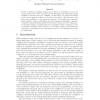Free Online Productivity Tools
i2Speak
i2Symbol
i2OCR
iTex2Img
iWeb2Print
iWeb2Shot
i2Type
iPdf2Split
iPdf2Merge
i2Bopomofo
i2Arabic
i2Style
i2Image
i2PDF
iLatex2Rtf
Sci2ools
AAAI
2015
2015
Strategic Voting and Strategic Candidacy
Models of strategic candidacy analyze the incentives of candidates to run in an election. Most work on this topic assumes that strategizing only takes place among candidates, whereas voters vote truthfully. In this paper, we extend the analysis to also include strategic behavior on the part of the voters. (We also study cases where only candidates or only voters are strategic.) We consider two settings in which strategic voting is well-defined and has a natural interpretation: majorityconsistent voting with single-peaked preferences and voting by successive elimination. In the former setting, we analyze the type of strategic behavior required in order to guarantee desirable voting outcomes. In the latter setting, we determine the complexity of computing the set of potential outcomes if both candidates and voters act strategically.
| Added | 12 Apr 2016 |
| Updated | 12 Apr 2016 |
| Type | Journal |
| Year | 2015 |
| Where | AAAI |
| Authors | Markus Brill, Vincent Conitzer |
Comments (0)

